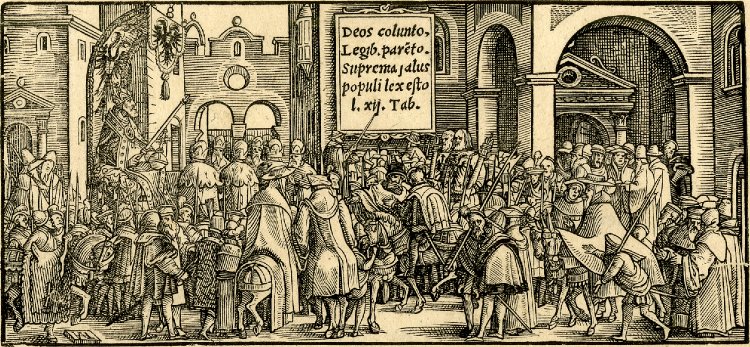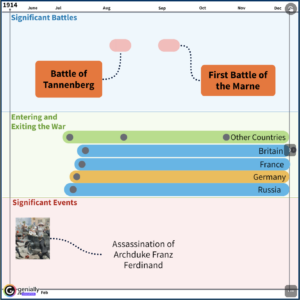In 1517, when the 95 Theses were first posted, Martin Luther had no intention of breaking from the Roman Catholic Church. Rather, he sought to reform the Church’s view on indulgences, believing that no one could buy their way into heaven. Believing that his view was deeply rooted in Scripture, he was confident that Church scholars would agree with him. Instead, the Church hierarchy responded by accusing Luther of heresy, wanting to quell any question of their authority. As a result, what was initially an effort to reform the Catholic faith eventually transformed into a major schism in Christianity itself.

Prior to sparking the Protestant movement, Martin Luther was an Augustinian monk teaching at the University of Wittenberg in Germany. In 1517, Pope Leo X sanctioned indulgences to be sold to raise money for the construction of St. Peter’s Basilica in Rome. An indulgence consisted of money given to the Church in exchange for less time in purgatory, which was conceived as a theological waiting room where imperfect souls were purified after death before they enter heaven. People essentially believed that this meant they could buy a way into heaven for themselves and their loved ones.1 As a result of the Pope’s decree, a Dominican monk, Johann Tetzel, began preaching in favor of these indulgences in the towns of Jüterbog and Zerbst near the university.2 Luther responded to this by writing to the archbishop, admonishing him by asserting that simply paying money to the Church does not purify the soul.
When his protestations went unanswered, Luther posted his 95 Theses. The theses were arguments opposing the manner in which indulgences were being sold.3 Most of the theses did not contradict Catholic doctrine, so it is widely believed that Luther wrote them to spark a theological academic debate. The theses, originally written in Latin, were translated into German and put into wide circulation; this caught the attention of Rome. Fearing that the funding for St. Peter’s Basilica was under threat, Leo ordered Luther to be investigated. In response, Luther sought the support of a Germanic prince, Frederick the Wise. Frederick granted Luther support and protection, insisting that the investigation take place in Germany.4 In response, Leo asked the papal legate in Augsburg, Cardinal Cajetan, to investigate Luther. Brought before Cajetan, Luther was asked to renounce his theses and recant his accusations against the Church. Luther refused, but agreed to stop commenting on indulgences and listen to the Church. Although this was not Cajetan’s desired result, Frederick allowed Luther to return to Wittenberg.5

The following year, 1519, Luther agreed to debate the theologian Johann Eck. Eck instigated the debate by comparing Luther’s positions to Jan Hus, a well-known heretic that had been excommunicated and executed a hundred years earlier. This forced Luther to declare that the Church had been wrong to condemn Hus, opening himself to charges of heresy.6 Eck had given the pope the opportunity to bring excommunication charges against Luther. However, the Holy Roman Emperor Charles V, not wanting to upset Frederick the Wise, forced the pope to subject Luther to a hearing at the Diet of Worms. At this time, Luther’s cause was gaining popularity among Germans. The emperor could not afford to upset the German prince, needing his support to fight an ongoing war with France and keep the Ottoman Empire from Austrian lands.7
During the trial, Luther was led into a room where his accusers had piled his works on a table, read the titles aloud, and asked if these books belonged to Luther. Luther replied that the books belonged to him. He was then asked to renounce them. Luther then asked for time to consider. When he returned the next day he refused to reject anything, saying that unless he was disproved by Scripture, he was bound by his conscience to defend his work.8 He felt that he was strongly supported by the Bible. However, Church officials saw this as a rejection of their authority rather than an appeal to Scripture. Charles V, though angered, could do nothing to condemn Luther as long as he remained at war. Instead, he planned to send Luther back to Wittenberg marked as a heretic.9 However, before he reached the university, Frederick the Wise secretly had Luther taken to Wartburg Castle.10
Throughout the next few years, Luther continued to defend his works. One of his biggest achievement during this time was the translation of the Bible from Latin into German. Still, he was forced to remain hidden. Charles V, after securing an alliance with the pope in the war against France, no longer needed ties with Frederick the Wise. This allowed the papal bull, proclaiming Luther’s excommunication, to be issued, adding a decree which ordered that no one give Luther refuge.11 It was ultimately his refusal to retract his works that prevented Luther from reforming the Church. Pope Leo X, Charles V, and other high Church officials perceived Luther’s passion for reform as a challenge to authority. In contrast, Luther believed that his works were strongly supported in Scripture. The miscommunication and stubbornness of both parties ultimately led to a major schism within Christianity. When the Church labeled him a heretic, Luther had no choice but to begin his own branch of Christianity, Lutheranism, so that he could continue to practice the faith to which he had dedicated his life.
- Renaissance and Reformation Reference Library, July 2002, s.v. “Martin Luther: Founder of Lutheranism” edited by Julie L. Carnegie. ↵
- New Catholic Encyclopedia, September 2003, s.v. “Luther, Martin” by Bill Ditewig. ↵
- Funk and Wagnalls New World Encyclopedia, 2016, s.v. “Luther, Martin” ↵
- Renaissance and Reformation Reference Library, July 2002, s.v. “Martin Luther: Founder of Lutheranism” edited by Julie L. Carnegie. ↵
- New Catholic Encyclopedia, September 2003, s.v. “Luther, Martin” by Bill Ditewig. ↵
- Renaissance and Reformation Reference Library, July 2002, s.v. “Martin Luther: Founder of Lutheranism” edited by Julie L. Carnegie. ↵
- Renaissance and Reformation Reference Library, July 2002, s.v. “Martin Luther: Founder of Lutheranism” edited by Julie L. Carnegie. ↵
- Encyclopedia of World Biography, December 2004, s.v. “Martin Luther,” by Andrea Henderson. ↵
- Julius Koestlin, Life of Luther (Project Gutenberg Literary Archive Foundation, 2006), 105-116. ↵
- Funk and Wagnalls New World Encyclopedia, 2016, s.v. “Luther, Martin” ↵
- Julius Koestlin, Life of Luther (Project Gutenberg Literary Archive Foundation, 2006), 105-116. ↵



94 comments
Aaron Sandoval
This article is well done and has good detail in explaining the life of Martin Luther, and exactly why he wrote is 95 theses. This article brings Luther to the foreground and although he is commonly known, not many are truly aware of the reasoning for why he disagreed with the Church and why he eventually began his own branch of Christianity and this article does a good job of telling that story. The sources used allowed the author to understand Luther and his personality, which was very beneficial in bringing this article to life.
Jose Chaman
This article is really interesting. First, it helped me to understand the historical context for the development of Luther’s 95 Theses much better. What I did not know and I am glad I learned is the whole process that Luther had to pass through to defend his theses and ideals: the debates and even to confront the Catholic Church itself.
Nicholas Robitille
This article was very helpful when I tried to study for my history test. It was very informative as well, as I hadn’t known that Martin Luther was not trying to be radical towards the church. He was only trying to reform the church gently in order to better serve it. Church politics seemed to have gotten in the way of this, however and caused a problem. It is a shame how politics got in the way of true faith for this man who only tried to help.
Nicole Ortiz
I have heard of Lutherans before but i never really understood what they believed in or anything. I had first heard about Martin Luther in my AP World History class that i took my junior year but i learned more about him this past year. It’s incredible to see how when you’re just standing up for what you believe you and going against the “norms”, you would be labeled as a heretic. The good thing is that Martin Luther never stopped trying to stand up for what he believed in, kept with it, and indeed did end up changing history as a reformer, not a rebel
Olivia Tijerina
After hearing about Martin Luther, I have developed an interest in how his action of faith had led to a monumental response of Rome. A simple action that was only meant for the University of Wittenberg to see in one language but by and large is then translated to German for the rest of the population to see. The message notes that through his persistence in not declaring what he had wrote wrong , lead to another branch of religion which was never intended by Martin Luther.
Addie Piatz
Growing up Lutheran, I have heard this story ever since I can remember. I personally do not think that Luther was a rebel but I do however think he was one of the only people brave enough to disagree with the catholic church and actually do something about it. Him translating the Bible from latin to German opened up the Christian religion to more people thus spreading the word of God which is what churches intend to do anyways.
Jacob Silva
Such an interesting and fascinating article. Martin Luther is definitely a reformer as he saw that there were misguided principles and ideas that the Catholic Church were promoting and that they needed to be addressed. Specifically, Luther said that the idea of indulgences is wrong and that only faith in Christ can get you to heaven. Luther stood by his ideas even if his life was at stake and I think that’s admirable.
Eliezer Leal
What a great article. I had only ever heard pieces of Martin Luther’s story and Knew he had his own type of Christianity but I never knew how it came to be. This story was very interesting because of how Luther stood by his work even though he knew the cost would be his life. This goes to show how much dedication some people have if they truly set their mind to something.
Nelly Perez
I cannot see Martin Luther as a rebel. He only had different beliefs. He did not mean to start a war between him and the Catholic Church. The German princes really praised him and protected him from the church. He only sparked a disagreement. He also managed to translate the Bible from Latin to German so others could read it since no one could really understand Latin. He should not have been seen as a bad guy.
Vanessa Quetzeri
I had heard of Lutherans before but never understood what they believed in or where they originated. I find it upsetting that there was so much pride within the Catholic church at the time, so much so, that when Luther made a very valid point, they immediately got on the defense. If everyone could just buy their way into heaven, what would be the point of living a just and moral life in the first place?